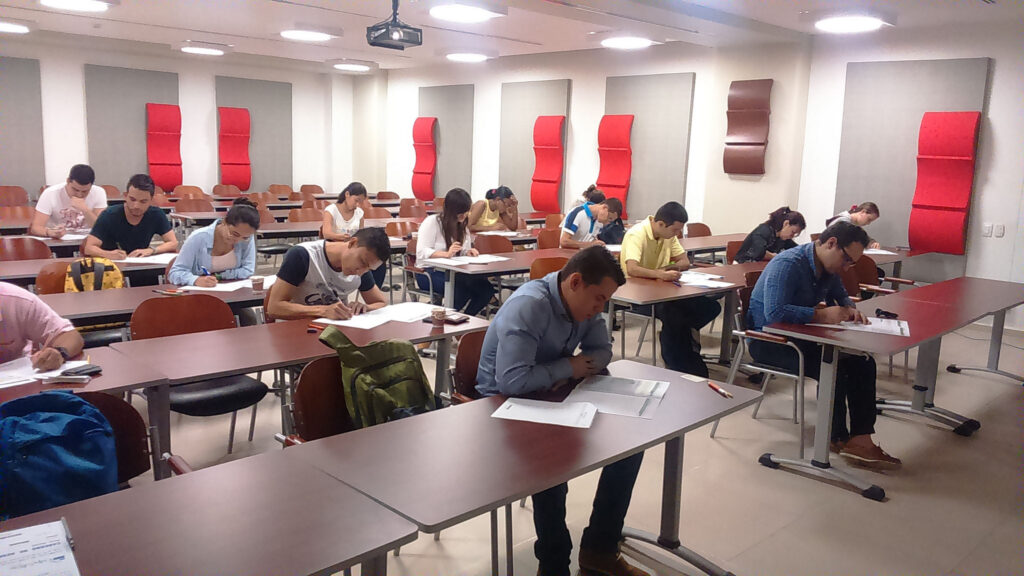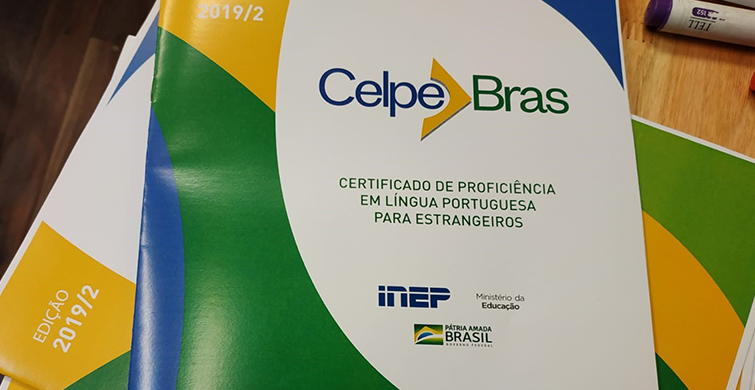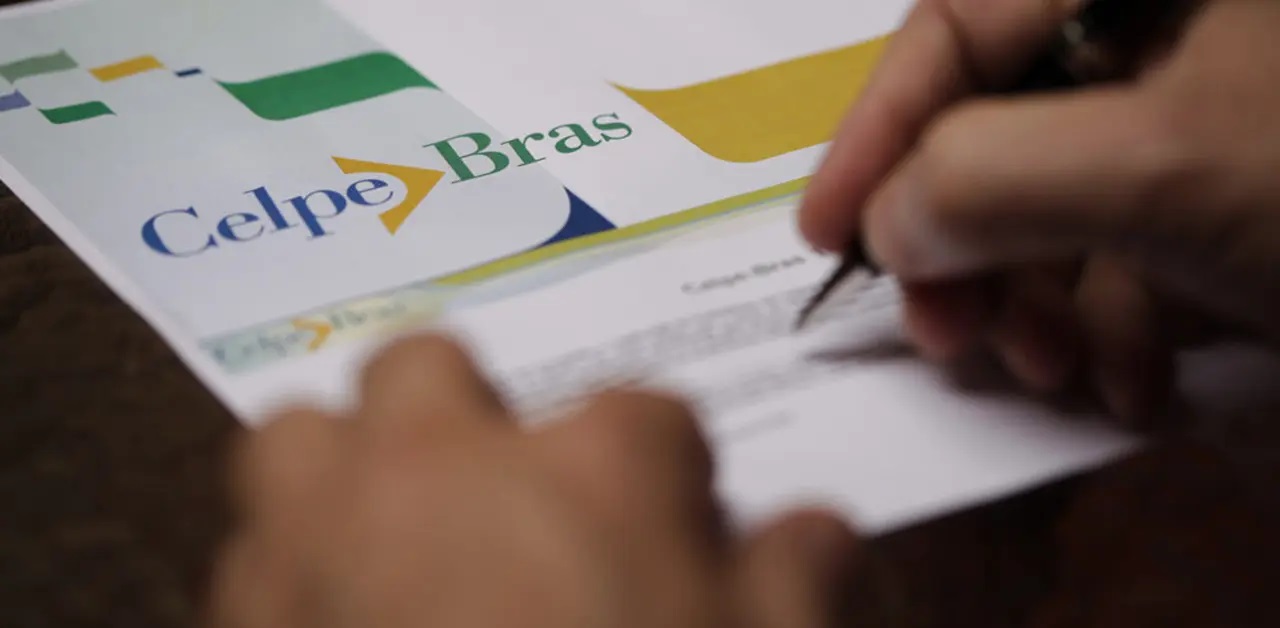CELPE-Bras (Certificate of Proficiency in Portuguese for Foreigners) is the only certificate of proficiency in Brazilian Portuguese as a second language officially recognized and developed by the Brazilian Ministry of Education. The Celpe-Bras exam is offered in Brazil and many other countries, such as the United States, Germany, Chile, Colombia and Japan, with the support of the Brazilian Ministry of International Relations.
The exam is taken by learners of Portuguese who wish to gauge their progress or who wish to provide proof of their level of proficiency, students planning to study at a higher-education institution in Brazil, professionals who wish to have an academic certificate from their own country validated in Brazil or who need to register with professional bodies such as the Brazilian Federal Council of Medicine.
Celpe-Bras exam in deep
- Levels
- Format
2 a. Writing
2 b. Oral
2 c. Assessment
2 d. Timing - Registration
- How to study for Celpe-Bras
4 a. Exam Structure
4 b. Do Mock Tests
4 c. Write Every Single Day
4 d. How to Practice for Celpe-Bras?
4 e. Note of Caution - Celpe-Bras preparation class
Levels
All candidates take the same exam, and are subsequently classified as having attained one of four levels of proficiency: intermediate, upper intermediate, advanced, or highly advanced.
Format

Celpe-Bras written
3 hours Task 1 and 2 – Tasks integrate oral comprehension (video and audio) and written production. Tasks 3 and 4 – Tasks integrate reading and writing. The different parts of the writing component take place consecutively in one sitting, with no breaks.
Celpe-Bras Oral
20 minutes The oral component takes the form of a face-to-face conversation with an examiner, which is audio recorded.
Part 1 (5 minutes). The examiner asks the candidate questions about a range of familiar topics – their home, family, work, studies, interests, etc. The questions will be based on the questionnaire the candidate completed when registering for the exam.
Part 2 (15 minutes). Candidates are given a short text. They have one minute to read it before engaging in a conversation about it with the examiner, answering various questions. This is repeated with two further texts, making three in total. The speaking component will take place up to two days after the writing component. The test centre will advise.
Assessment
Written component: The candidates’ comprehension of the audio/video recordings and text will be assessed through their written answers.
The examiners assess: 1. Discourse adequacy: is the text in the appropriate genre? Is its purpose clear? Is the information appropriate? 2. Textual adequacy: is the text clear? Is it coherent? Is the register appropriate?
Oral component The candidates’ spoken Portuguese – and their understanding of spoken questions – will be tested. Particular attention will be paid to their interactional competence, fluency, lexical and grammar adequacy and pronunciation.
Timing
The exam is held twice a year, usually in April and October. The registration periods are usually in February–March and August–September.
Registration
Registration for the test is conducted online, for a fee, at the website of local Celpe-bras test centers. The writing component takes place on a Tuesday morning. The speaking component takes place on a Tuesday afternoon or on the Wednesday or Thursday.
Identification is required, and the results will be available online, within three months of the exam.
How to study for Celpe-Bras
Okay. You finally decided to get your certificate of proficiency in Portuguese.
You have already registered, paid your entry fee, and now you don’t know how to prepare for Celpe-Bras.
Worse still, you’re freaking out over the speaking part of the exam… Because, after all, it’s been a long time since you last spoke Portuguese for an entire hour.
Well, even though the scenario looks scary, you can still manage to attain a good result in your Celpe-Bras.
Students who took part in the examination usually suggest the following to get good results.
Familiarize Yourself with the Structure
Like with other language proficiency examinations, our Celpe-Bras also follows a rigid structure.

There’s a speaking component to the exam, and a writing component as well.
But unlike other tests, Celpe-Bras doesn’t have a grammar part.
That’s because they assess your grammar level by checking your composition.
Do Mock Tests
You’ll be under pressure. There’s no way around it. If you want to get more comfortable and stand a chance to get your Intermediário Superior certificate, then you want to do mock exams.
But time yourself.
You have twenty minutes total for your speaking part.
And you have three hours to write for texts.
Do you think that’s a lot?
When you’re holding your pen and thinking about what you want to write, the arms of the clock race.
So, try to do things before time runs out.
Write Every Single Day
As said before, there’s no grammar part in the Celpe-Bras exam. You’ll write four compositions in response to the stuff you read or listen to.
Writing in a foreign language isn’t easy. It demands more skills than most people have. You want to strengthen those muscles before the big day.
What do you write about? That’s a good question.
You should write about events that are happening now. You can write your impressions of it… A letter to the editor… Or even rewrite the whole thing…
The suggestion is to write about the news for three reasons:
- Most of the recordings of the listening part are taken from the daily news broadcast.
- You’ll never run out of sources for your compositions.
- And in the speaking component, most of the materials used to spark up conversations are taken from the daily news as well.
- Hire a Teacher to Help You
- But don’t do it before you start practicing.
If you want to make the most of your time, you should do the previous exams as if it were the real thing — with timing and all. Only then should you hire a teacher to help you correct what you got wrong and give you some pointers as to what you can do from now on.
How Will I Need to Practice for Celpe-Bras?
It depends on where you are.
If you’re a beginner right now and want to obtain the advanced certificate… That might be possible… but it’s unrealistic.
Now, if you are at the intermediate level and want to get the advanced certificate, that might be possible. And it’s realistic.
Most of my students who got good grades in this examination studied an average of six hours a week. Sometimes more, sometimes less.
An Important Note of Caution
For the listening comprehension component of the Celpe, bear in mind that the recordings are really crappy.
Students usually complain about that. It’s good to practice the recordings with a teacher.
As a native speaker, I can say that the recordings didn’t have good quality. And, because the language isn’t adapted, non-native speakers of Portuguese will find them terribly hard to understand.
Do your due diligence and check the recordings — and past exams — here.
So, do you have any other preparation tips? Have you ever taken the Celpe-Bras before? Tell us in the comments below

